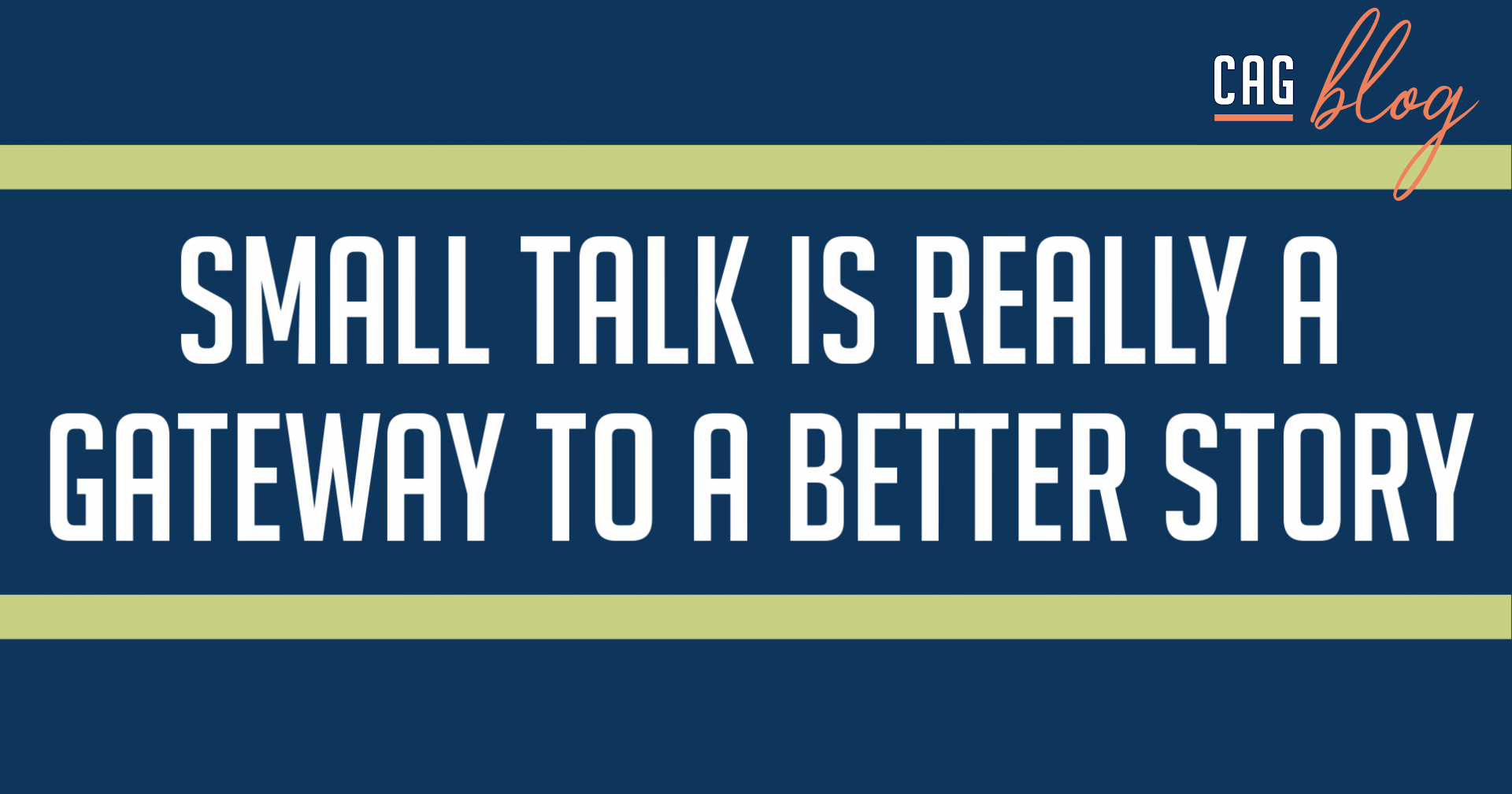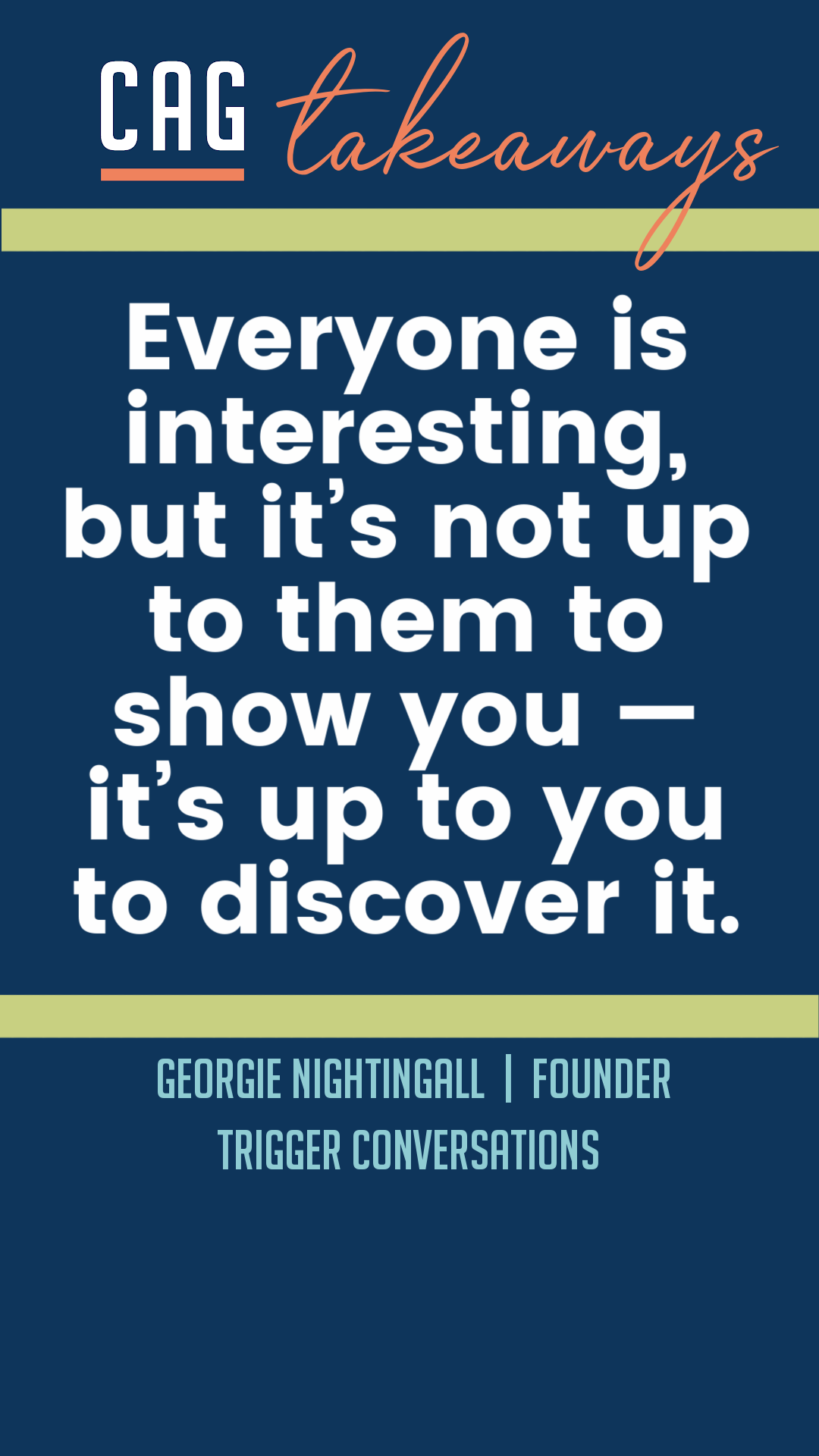
20 More Interesting Ways to Make Small Talk
I don’t know about you, but the thought of going up to random strangers and striking up conversations leaves something to be desired. Part of the challenge is the “what.” What will we talk about? What will interest them? What won’t make them uncomfortable? What won’t make me look like a weirdo?
If I’m having a pretty solid day, I’m fairly good at making a meaningful connection. But…if I’m having an off day, the mental load of getting it right can be daunting. Maybe you feel the same way? Maybe you cling to the ring of the room desperately trying to remind yourself why you came to the networking event, social outing or meeting anyway.
No? Just me?
I decided to do something about it. Here are 20 more interesting ways to make small talk the next time you’re feeling tongue tied with your new would-be connections and a handy way to remember them—even on the spot.
TALKING TO STRANGERS
To be honest, I got inspiration for this post by reading Joe Keohane’s recent article for Entrepreneur, “How to Become a Master at Talking to Strangers.” In it, he talks about practicing. A lot actually. So it got me thinking about how getting used to small talk is probably akin to practicing any other art, craft or sport. The more you do it, the more likely you are to be better at doing it and not suffer from performance anxiety. It’s a mental muscle to be flexed. So it’s not a matter of having nothing to say, it’s a matter of thinking about what small talk is…a gateway to something better to say. And we’re probably all pretty out of practice at this point in our lives. That’s why we’re going to need a primer, and a few more interesting ways to make small talk….well, interesting again.

GETTING STARTED WITH SMALL TALK
I’m sure you’ve seen several articles giving you long lists of ways to make interesting small talk. The problem is, they’re hard to remember. So that’s all well and good when you’re reading an article on your way to work, but if you’re going to be put on the spot, you’re probably going to need small talk help you can actually recall in a pinch. So that’s why I built a small talk mnemonic because I was never (for the life of me) going to remember the hundreds of ideas I’d run across.
I decided the easiest way to think about small talk was the SENSES…what can you see, smell, taste, touch or hear that leads you to a story to help you with your small talk gateway convo starters. Here’s a bunch of examples of ways to make small talk more interesting:
WORK WITH WHAT YOU CAN SEE
Depending on where you’re meeting someone or how well you know them will greatly impact what all you have to work with. But there’s loads you can either see directly on the person, or in your surroundings that can serve as an interesting small talk starter.
? 1. CLOTHING & ACCESSORIES
What’s the person wearing that gives you something to work with? Cool new dress? Funky glasses? Antique watch? Sports jersey? New kicks? Keep the conversation light and about the items and not how the person looks in the items.
? 2. CARGO
What’s the person bringing along with them? Backpack? Briefcase? Journal? Newspapers? Magazines? Books? Work files? These little accessories offer a peek into what interests the person in the moment and something for you to ask about.

? 3. AFFILIATION CUES
Does the person have on a name badge or other identifier that you can talk about? Custom license plate? Bumper sticker? Branded notebook or other item? These can be a great way to learn more about a passion point.
? 4. SETTING
Where are you meeting this person and what does it offer in the way of small talk cues? Fun coffee shop? New restaurant? National park full of gorgeous trees and rivers? Kids’ soccer game? What’s around you can be a great way to form a bonding point.
WORK WITH WHAT YOU CAN SMELL TASTE OR TOUCH
Here are several interesting small talk ideas focused on things you can either smell, taste, or touch. Some examples:
? 5. FOOD & DRINK
This may seem like an obvious one, but a great deal of bonding can happen over food and drink conversations explored. This can be about texture, color, plating, or a culinary adventure experienced in tandem.
? 6. BAKING BREAD & SUMMER SUBWAYS
Not all smells are pleasant. Some are so pleasant they bring people in hypnotically from across the globe. Bonding over the aroma in the air can be a great gateway to a meaningful story or strong memory. It can also make for a helluva laugh.
? 7. THE GREAT OUTDOORS
Should you happen to be meeting outside, you’re in luck. The outdoors is full of things to smell, taste and touch and offers lots of pivot points. Related topics might be healthy lifestyles, air, water, streams, plants, flowers, gardening, or animals.
? 8. HOBBIES
Sometimes we’re lucky enough to enjoy someone’s company while we also learn more about their hobbies. Hobbies could be sensual if they happen to be about physical creations. If your new contact is a chef, baker or artist you might get to smell, taste or touch their work immediately. This is a perfect small talk gateway.
? 9. MEMORY TRIGGERS
When we’re experiencing smell and taste with someone else, they often can trigger memories. This is known as “the Proust effect.” For example, “This smell or taste reminds me of the time I visited the zoo when I was a kid, or how I loved to go to the circus.” This can be a lovely way to learn more about someone and help them share a related story.
WORK WITH WHAT YOU CAN HEAR
A focus on hearing the other party offers us a chance to really listen instead of talking. (For once.)
We’re inclined to want to talk two times as much as we listen, but we’d be better off and more well liked as conversation partners if we flipped that and only talked one-third of the time and listened the remainder. (The whole one mouth, two ears philosophy at work.)
People will give you a lot of verbal cues about what’s important to them right now, and if you know them at all, you might have seen some chatter on social channels to catch you up to speed. These are all active listening techniques and are a great basis for good ways to make interesting small talk that they will also find interesting.
Here’s a list of common topics you may have heard someone talking about recently that you can latch into for small talk fodder:
? 10. CHANGES AT WORK
Have they experienced any professional changes that are worth discussing further? How does that relate to your industry, community or mutual connections?
? 11. CHANGES AT HOME
Have they recently moved, redecorated or finished a home improvement project? Ask about it. Learn something new about painting or sanding you never thought you’d need to know.
? 12. FAMILY OR LIFE UPDATES
Have they experienced any family or life updates that are worth celebrating or mentioning? Sometimes these can be happy things, and other times more serious. You’ll need to consider your relationship and familiarity on this one and tread lightly. A child’s graduation is a wonderful thing. A cancer diagnosis might be something you allow your pal to help you navigate asking about with care.
? 13. PETS
I have a special fondness of pets, so if I hear anyone even mention a pet, I’m quick to jump on this and ask a bunch of questions and see the latest photos. I find people tend to love their pets as much as their children—and sometimes a bit more. (Don’t @ me. Pet parents will understand what I mean here.)
? 14. NEW ROUTINES
Sometimes you’ll overhear someone talking about a new routine. Maybe it’s a new morning workout, or perhaps they’ve shifted their work schedule to do a hybrid model. Maybe they’ve added a new bucket-list hobby to their life and have all sorts of reasons for doing so. This is a wonderful way to learn more about what matters to someone in this season of their journey.
? 15. PANDEMIC RECOVERY PLANS
I’ve stayed away from using the icky “P” word until now. However, we’re being bombarded with all sorts of verbal and written messages about the pandemic. It’s only natural that we might have some discussion around this for the next year or so, and how we’ve coped so far and how we’re going to recover together as we start to see humans again.
Using sound as a small talk cue isn’t only about what people are saying, but also about what’s going on around you too. Bells, whistles, the conversation in the next booth, the attendant at the counter, and what’s airing on TV are all also great mutually shared auditory experiences that can lead to interesting storytelling and bonding.
BUILD FROM THE SENSES INTO SOMETHING BIGGER: STORYTELLING
Speaking of storytelling, this is where we bridge from sense-based interesting small talk cues into something bigger and better—the stories themselves.
It’s hard to predict where a conversation will start and end up leading you, but there are a handful of stories that almost anyone is eager to tell, and scenarios you can help foster in order for people to share them.
Here are a few examples:
? 16. ASPIRATIONAL DREAMS
These can be all sorts of things from professional milestones to something as simple as what someone might be looking forward to doing the most now that we’re getting over the pandemic hump. It’s about handing a person a brush to help them paint a picture of a happy future scene.
? 17. LOOKING BACK
In the same way you can help someone look forward, you can also help them recall a recent memory. You could ask about what they missed the most during the pandemic and use that as a second gateway into another (happier) topic. Some of my friends missed live music, family visits and cocktail outings the most. These are all great ways to talk about bands, family and hip new restaurants and bars—all things worth enjoying.
? 18. PROUD MOMENTS
Many of the small talk starters above serve as nuggets into something bigger. And, we tend to not want to shine our own noses as much as others around us. So, one thing I like to ask people about are things their friends and family have done recently that made them proud. It could be a way a child stood up to a bully, or a friend who was humble and helpful to someone else. It could be a business success that perhaps they don’t think you know that much about, but you’d like to explore how the success is making them feel. These are all meaningful moments in building strong relationships.
? 19. JOY SPARKS
For a time, we were all about whether or not things “sparked joy.” But I want to double back on that for a second, and talk more about happiness and joy. What might you have seen in the interesting small talk starters that created a twinkle in someone’s eye? When we’re in a “I’m just getting used to what my new normal is again” headspace, there’s a chance to really focus on what’s making people feel happy right now. Or grateful. Or joyful. These are the joy sparks.
? 20. CULTURAL NORMS
Cultural relevance can mean a whole bunch of different things to different people, but whether you’re doing a deep dive on kayaking, movies, sports, television, fashion, technology or science—you’ve got lots of opportunities to make shared cultural interests more interesting.
Walking away with newfound knowledge, a deeper connection to new contacts—these won’t be serendipitous coincidences—they’ll be part of your new norm. Since you’ll be thinking about more interesting ways to make small talk in your life from now on, you might just be rewarded with a whole bunch of new reasons to share more of your own stories with others too.
Author Joe Keohane agrees:
“If you’re interested only in things you know you’re interested in, you will never be surprised. You’ll never learn anything new, or gain a fresh perspective, or make a new friend or contact. The key to talking to strangers, it turns out, is letting go, letting them lead. Then the world opens itself to you.”
Further Reading
Strategic Planning

Who Should Be Involved in Strategic Planning?
After you’ve learned more about strategic planning and whether you need a strategic plan of your own, you might start...
Marketing Strategy

Creating Your First Marketing Strategy – Free Template
Creating your first marketing strategy involves documenting the steps and ideas necessary to achieve your marketing...
Leadership

Courage & The Heart of Daring Leadership: Daring Leadership Series Part 2
Courage is the heart of daring leadership. So why is it so difficult to lead in a courageous way? In a...
Business Tools

Writing Your First Business Plan – Free Template
Writing your first business plan is one part knowledge, and another perseverance. Modern sentiment suggests that as an...
